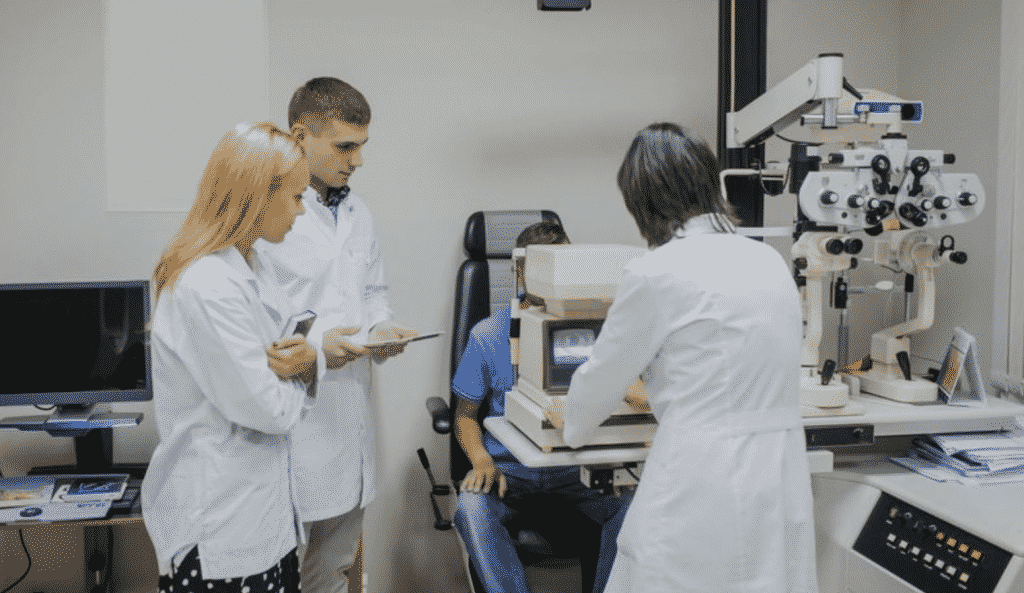An optometrist is a health professional who provides eye care, including vision testing and correction. They are trained to provide medical treatment for diseases of the eyes and visual system and fit people who need glasses or contact lenses. Optometrists diagnose conditions like diabetes and high blood pressure that can affect the eyes. This post discusses what an optometrist does in their day-to-day life, how it compares to other eye care professions, and some benefits you may get from being seen by one.
What does The Professional do?
Optometrists are trained to identify and treat various types of vision problems. From general exams, which include taking your medical history about any issues you may be experiencing with your eyesight; to more specific tests like refraction errors or visual acuity testing – optometry offers treatments that can improve the quality and comfort in all areas related to sight. Some of their other functions include:
Detect Eye Diseases
Optometrists utilize the ophthalmoscope to identify eye infections such as macular degeneration, glaucoma, and other ailments related to eyesight like diabetes or high blood pressure. And they don’t stop there–if their initial diagnosis doesn’t seem right after a few tests for irregularities in vision function, then these patients are subjected to further screenings that measure how much fluid is on the eyeball by estimating its thickness with another machine called A-scan ultrasonography.
Prescribe Drugs and Medication
Optometrists can prescribe drugs to treat and manage an array of ocular disorders for those with a need. The treatment or management of glaucoma-induced blindness can provide pharmaceuticals like antibiotics and antihistamines through topical use only.
A trained professional in eye care can also work alongside other medical professionals such as physicians when prescribing certain scheduled analgesics that may be appropriate after surgery on your eyesight due to forces outside their control such as injury.
Lenses
Optometrists are not limited to handling just the average contact lenses. They have a wide range of different types that they can prescribe for their patients depending on what kind of shape their cornea is or if they need special prescriptions like varifocal and toric lenses, too.
Some people with abnormal shapes in their eyes may be ideal candidates for getting fitted with contacts from an optometrist who has professional training because these doctors know how to handle more than normal shipping cases and will give you all your options before prescribing something, so take advantage!
How do Optometrists Differ from other Eye Doctors?
At a routine visit, you will see either an optometrist or ophthalmologist. Mainly, an ophthalmologist is a medical doctor who specializes in the care of eyes. They are trained to diagnose and treat all types of eye diseases, including cataracts, glaucoma, macular degeneration, etc. In contrast, Optometrists provide eyeglasses as well as other services such as diagnosis and treatment for minor vision problems like dry-eye syndrome or glare related headaches from computer screens, among others.”
Hence, there are two main types of doctors: Ophthalmologists who specialize in general eye health treatments ranging from surgery to prescribing glasses, and Optometrists who focus on providing prescriptions only that range anywhere between reading lenses up through prescribing.
What are the Benefits of Visiting an Optometrist Regularly?
Visiting an optometrist regularly has many benefits. There are plenty of optometrists in Australia. Visit any optometrist website and find the optometrist near me page to locate the nearest one from you. The following are the key benefits you will get from regular visits:
Early Detection of Health Conditions
A visit to an optometrist will let you know if any unrecognized health problems lurk in the background. You may be astonished by what pops up on your eye exam! Apart from diabetes, conditions such as high blood pressure or even glaucoma might show themselves with a closer look at those peepers.
Early Recognition of Visual Loss
If you don’t visit an optometrist, computer use could become even more dangerous because of the strain that comes from poor vision. One of the benefits of seeing an optometrist is they can test your eyes and notice problems you may have missed about yourself- this way, if anything changes in terms of balance or sight issues, then glasses are ready!
Treatment of Eye Diseases
Eye health is something that most people take for granted. An optometrist can help spot eye problems before getting worse and make sure you have optimum eye health throughout life! But, it’s essential to revisit the subject when you notice any changes in your vision or the appearance of your eyes because these could be signs of a severe medical problem.
A regular checkup from an optometrist can protect against long-term effects like blindness by letting them identify minor abnormalities early on so they may treat them more effectively than if left untreated at later stages. Professional services are always available through local doctors who specialize in this type of care – find one now to see what options are best for your individual needs!
Final Thoughts
It’s easy to think that you’ll never need eye care and then suddenly find yourself in the worst-case scenario. If your eyesight has been compromised due to an injury or because of a medical condition such as diabetes, it may be time for regular visits with optometrists. Why? An optometrist can help ensure any damage from previous accidents is repaired so that you can see again! Would you mind not putting off seeing an expert until later on- take advantage of their expertise now by making appointments regularly while they’re still available.
